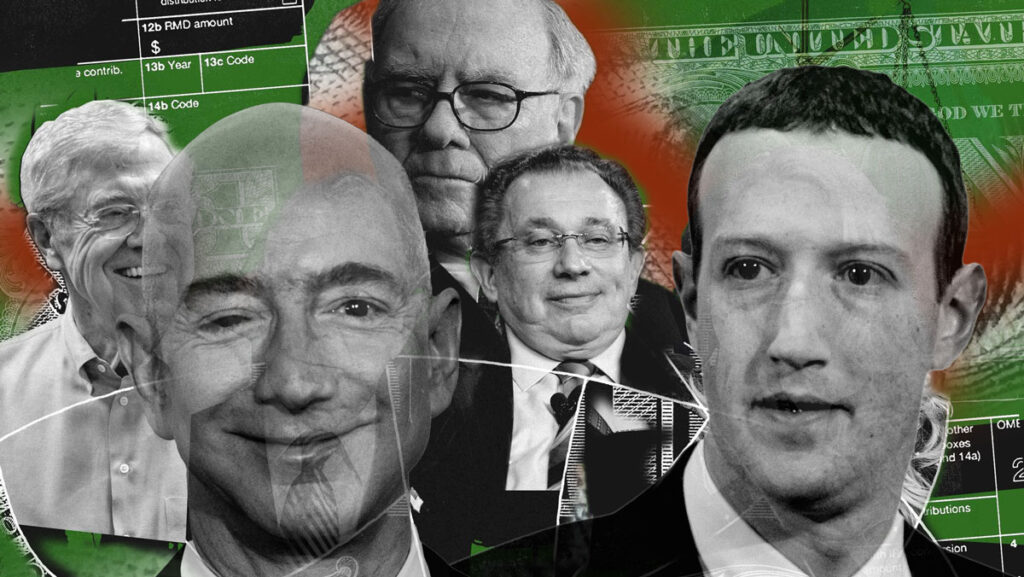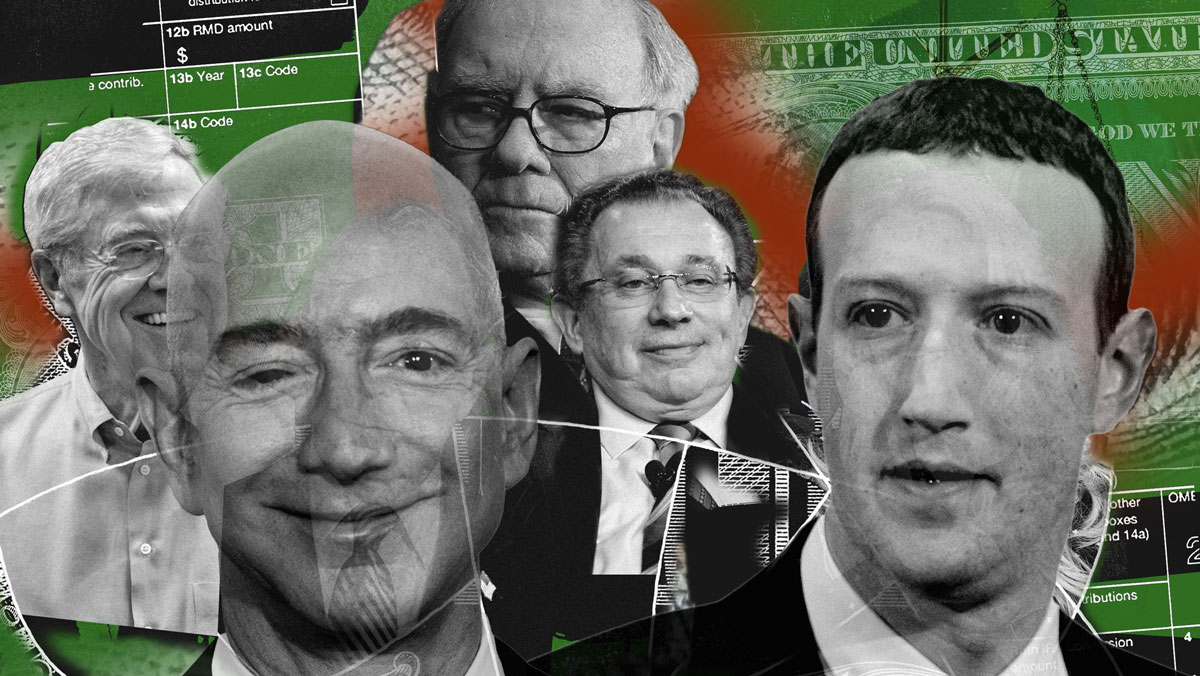
Above: Photo / collage / Lynxotic / various
The wealth-hoarding by ultrarich families would be equivalent to over four Build Back Better plans
Over the next few decades, the richest American families could avoid paying about $8.4 trillion in taxes, or more than four times the cost of the stalled Build Back Better package, according to a report released Wednesday.
“We can fix our broken estate and gift tax system… or we can trust our democracy to a handful of trillionaire trust fund babies.”
The Americans for Tax Fairness report—entitled Dynasty Trusts: Giant Tax Loopholes that Supercharge Wealth Accumulation—urges Congress to fix the federal tax code to address dynastic wealth.
The new analysis details how loopholes have made the payment of estate, gift, and generation-skipping taxes—collectively called wealth-transfer taxes—effectively optional for the “ultrawealthy” and thereby accelerate the “accumulation of dynastic wealth.”
“Ultrarich families use dynasty trusts—the term for a variety of wealth-accumulating structures that remain in place for multiple generations—to ensure their fortunes cascade down to children, grandchildren, and beyond undiminished by wealth-transfer taxes,” the report explains.
Some U.S. states, such as South Dakota, have even changed their laws on dynasty trusts to attract wealthy residents, as Chuck Collins of the Institute for Policy highlighted last year.
The new report notes that U.S. lawmakers aren’t planning to address the issue, even if the Senate passes a version of a House-approved package:
The Build Back Better (BBB) legislation now before Congress—otherwise a vehicle for significant progressive tax reform—does nothing to directly reverse this toxic accumulation of dynastic wealth. Moreover, some dynasty trust reforms that were included in the bill passed by the House Ways and Means Committee in September 2021 were stripped out before the House voted on the measure in November.
The BBB bill needs full support from Senate Democrats to pass. Sen. Joe Manchin (D-W.Va.)—one of the primary reasons the legislation hasn’t reached President Joe Biden’s desk—said Tuesday that it is “dead.”
However, Americans for Tax Fairness still uses the whittled-down BBB package to illustrate just how much money wealthy Americans can hoard for their families in the years ahead thanks to the U.S. tax system.
“The tax savings for the richest families could be about $8.4 trillion over the next 24 years or so if the current 40% estate tax rate remains in place,” the report states. “That’s the equivalent of more than four Build Back Better plans costing $1.75 trillion each over 10 years.”
The report adds that “about half of the $8.4 trillion is equivalent to the cost of the expanded child tax credit, which was included in the House-passed BBB bill and is estimated to reduce childhood poverty by 40%, for 24 years at $160 billion a year.”
“This hoarding of wealth is inexcusable,” declared the report’s principal author, Bob Lord, who practiced estate law for 30 years before joining Americans for Tax Fairness as tax counsel.
“The BBB legislation now before the U.S. Senate should be amended to close loopholes in the three components of America’s wealth transfer tax system: the estate, gift, and generation-skipping tax,” he asserted. “Effective reforms have already been developed—all that’s needed is for Congress to recognize the urgency to act now.”
The group’s new analysis and call for action come after Americans for Tax Fairness estimated last month that the 10 wealthiest billionaires in the United States have become approximately $1 billion richer collectively every day of the Covid-19 pandemic.
Wednesday’s report contains a warning about that group of ultra-billionaires, mentioning by name Amazon’s Jeff Bezos, Facebook’s Mark Zuckerberg, and Elon Musk of Telsa and SpaceX.
“As much as familiar fortunes have blossomed in the low-regulation, low-tax, wealth-worshiping environment of the previous 40 years,” the report says, “the next 40 and beyond could see the rise of economic dynasties that will make the old money look small.”
Along with closing dynasty-trust tax loopholes, Americans for Tax Fairness urges reforms that would “curb the year-to-year accumulation of wealth in existing trusts.” Specifically, it calls for a new income-tax bracket “on undistributed trust income in excess of $250,000 that is five percentage points higher than the maximum income-tax bracket for individuals.”
Noting a proposal from Sen. Elizabeth Warren (D-Mass.), the group also encourages U.S. lawmakers to “impose an annual 2% wealth tax on the portion of a dynasty trust’s holdings that exceed $50 million, and an additional 1% on dynasty trust accumulations in excess of $1 billion.”
“The choice is clear,” according to the report. “We can fix our broken estate and gift tax system and stop the concentration of an ever-larger share of America’s wealth inside enormous dynasty trusts, or we can trust our democracy to a handful of trillionaire trust fund babies.”
“Fortunately, we know what needs to be done,” the report concludes. “The sole remaining challenge is to summon the courage to stand up to the holders of dynastic wealth and their enablers.”
Originally published on Common Dreams by JESSICA CORBETT and republished under a Creative Commons license (CC BY-NC-ND 3.0)
Related Articles:
- What if “Non-human Biologics” are Watching?
- ‘Most Significant Charges Yet’: Trump Indicted for Trying to Overturn 2020 Election
- But what am I?’ Pee-wee Herman creator and star, Paul Reubens dead at 70
- The Congressional Hearing On UFOs Confirmed the Existence of Aliens? Maybe
- The Earthly Frontier: Building a Sustainable Future at Home
Find books on Political Recommendations and many other topics at our sister site: Cherrybooks on Bookshop.org
Enjoy Lynxotic at Apple News on your iPhone, iPad or Mac.
Lynxotic may receive a small commission based on any purchases made by following links from this page
